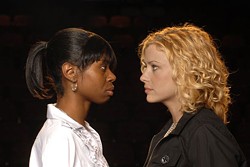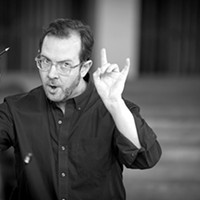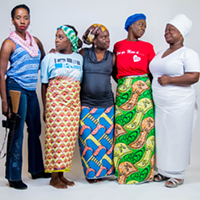Chalk up another fine premiere for Children's Theatre of Charlotte and artistic director Alan Poindexter. The Drama Club delivers the most gripping and pertinent playwriting we've seen from former WBTV news anchor Bob Inman in his fruitful post-retirement. He is definitely stretching himself, the ImaginOn audience, and Children's Theatre with this intrepid new script. Looking frankly at race relations in a contemporary high school, Inman has compelled Children's Theatre to stretch its talent pool to make it work.
Perhaps because the plot runs so parallel to High School Musical, the cut corners in the script aren't noticeable until after intermission. Mr. Brady is the faculty member all aspiring thespians must impress here, and Emily is the presumptive drama queen who figures to snag the lead in the upcoming production of The Importance of Being Earnest.
The fresh twist is the fresh meat that usurps Emily's throne. Tasha is black, well-travelled, comfortable with her newcomer status, and not intimidated by Emily's talent, race or presumptions. Yes, it's quite conceivable that a clash between these two divas could heat up and yield electrical sparks. Given the climate at the high school, nicely developed in dialogues between Brady and the new black school principal, Mr. Pettigrew, those sparks could ignite something serious. Still the first act curtain is deftly engineered to exceed expectations, riot choreography courtesy of longtime Poindexter cohort Delia Neal.
Onstage roles are handled no less capably, even with the teens portrayed by adults. Sidney Horton effectively blends edginess, empathy and authority as Principal Pettigrew, while Mark Sutton, who has moved into directing in recent years, is a natural choice for Brady. As Tasha, Shon Wilson captures the newcomer's blend of confidence and defiance to perfection, and Johanna Jowett seethes with declasse resentment as Emily.
The only moment I don't believe Jowett -- as a teen, rather than as an adult -- is when she asserts that the lead in the Oscar Wilde comedy is "my role." Here is where those shortcuts begin creeping in and taking their toll. Aside from Brady's remarks on her exceptional talent, made to her in private confrontations, there's no intimation that Emily's dramatic sovereignty is accepted among her peers and no reference to any triumphs prior to her senior year. When Emily boils over at not being cast in Earnest -- Brady authorizes her to direct the production instead -- she sees reverse discrimination as the only plausible explanation.
But it's a bit fuzzy how Emily's feelings ignite the riot. Our story is narrated by the Camera Kid, portrayed by Jon Parker Douglas with an endearing grunginess, and input into his digicam is often projected live on the upstage wall. Yet there's some ambiguity about whether anybody else pays attention to Camera Kid or what might be lurking on his two-inch screen, and it must be a disembodied camera -- without the Kid -- broadcasting the powwows in Pettigrew's office.
These gaps don't seem to diminish the power of the Act 1 climax, but they proliferate after intermission, when Inman drops all focus on the progress of Earnest -- or Poindexter amputates it to keep the running time at a trim 87 minutes. Among the crucial plot points left unaddressed: Who else besides Tasha is cast in the show? Who takes over as director when Emily blows that responsibility off? How does the production of Earnest gel amid a racial chasm dividing the entire school, a chasm that originated within the drama club? During some of the club meetings we do see, it seems improbable that any purposeful work on the show is happening.
With all this infrastructure neglected, it seems like Inman and Poindexter are leaning hard on the old last-minute-theater-miracle cliche to bolster belief. Nor does it help that the extra playlet produced by the students lacks even a weak impact unless you've seen its echo at the beginning of Inman's play.
What aggravates me runs deeper, for The Drama Club glosses over the fact that theater is more than a civilizing force for spectators. The enterprise of putting a play onstage is necessarily a cooperative venture. To succeed onstage, participants have to check their personality conflicts offstage. Everybody involved in this production knows that. But we only get a feeble affirmation that drama clubs are worth having.
Blessed, however, are the peacemakers. Ericka Ross makes a wonderful debut as Flora Simmons, Emily's best friend, who is estranged during the turmoil yet ultimately dogged in her resolve to reconcile the races and the chief combatants. No less convincing is J.R. Adduci as Carlos, the fence-sitting Hispanic who jumps off his fence in response to Flora's eloquence.
Inman deserves kudos for "keeping it real" in his dialogue without profanities that might bother educators, and his cracker-barrel wit shines through unobtrusively at key moments. So this show could eventually have legs and play successfully elsewhere. To make that a realistic expectation, Inman must first add some muscle to the calves and thighs.
Latest in Performing Arts
More by Perry Tannenbaum
Calendar
-

NEW WINDOW GALLERY-Pat Rhea-ACRYLIC PAINTINGS-April 05-30 2024 VALDESE, NC 28690 @ New Window Gallery/Play It Again Records
- Through April 30, 12 p.m.
-
Derek Hough - Symphony Of Dance @ Ovens Auditorium
-

"Blood Residue Analysis of Paleoamerican Stone Tools in the Carolinas" @ Native American Studies Center
- Fri., April 26, 12-1 p.m.
-

ARTS RENAISSANCE, a GALA supporting the ARTS in South Carolina @ the Columbia Museum of ART
-
 The Piano Guys @ Ovens Auditorium
The Piano Guys @ Ovens Auditorium
-
Charlotte ink 7
Behind the pain with a trio of the Queen City's finest tattoo artists
-
The death of CAST 5
What really happened to Charlotte's beloved experimental theater company?
-
Jessica Moss Makes the Gantt Center a Safe Zone for Local Artists 2
Flipping the script














